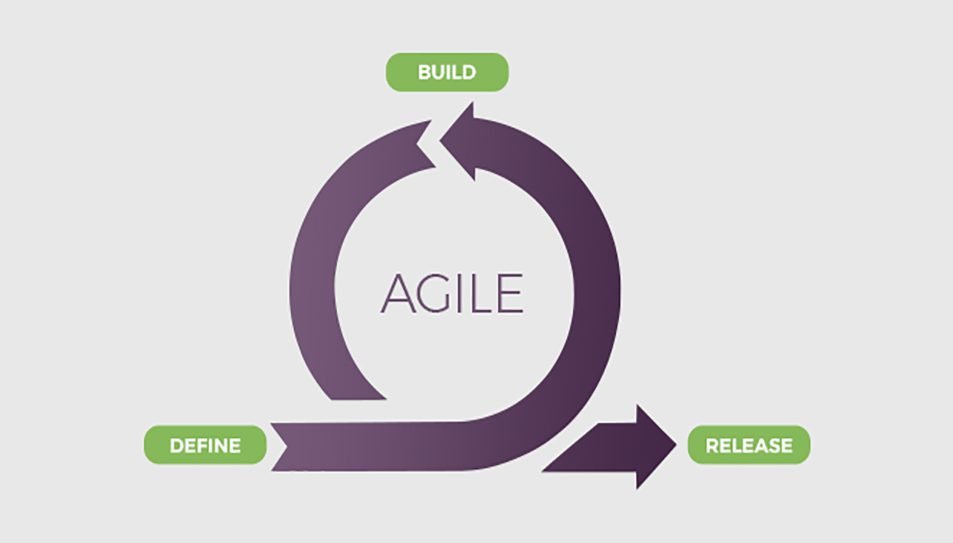Agile thinking is Lean and continuous. It relies on Scrum values and a number of different methods that form a combination way of tackling solutions to improving productivity and efficiency in enterprises with a large emphasis on customer-first policies and principles. Agile has caught everyone's imagination because of the fantastic outcomes from transitioning to these values.
The Methodology Involved
Agile is no methodology. In reality, it is a way of thinking, a task-training philosophy and a flexible simple mindset. It comprises of Scrum frameworks and others too along with different sets of methodologies that aid specific task aspects in the Agile Manifesto.
The frameworks and methodology sets that are used in Agile are
• Scrum methodology
• Lean development of software.
• DSDM/ Dynamic-Systems-Development method
• XP/ Extreme Programming.
• ATDD/ Acceptance-Test-Driven-Development method.
• TDD/ Test-Driven-Development method.
Let us explore how these methodologies fit into the Agile framework and its practice.
Scrum:
Scrum is widely used in software development using Agile as an incremental and iterative way of handling team-oriented developmental software projects, applications, and products. The Scrum team members are all equal and work together towards the common goal while being flexible, self-organizing, communicative and collaborative as a team. Scrum also works very well with tools and techniques in TDD, DSDM, Lean and XP and offers an excellent framework to function in.
Lean development:
Lean agile methodology principles emphasize minimizing waste and maximizing customer-values to create the ideal customer-environment with minimum resources, focused key processes and zero waste. Optimization of assets, technology, product flow, inter-departmental communications, and various inter-related processes all along the value-stream leads to eliminating wastage. Such practices do lead to lower costs, higher production, more efficient processes, faster time-cycles, lesser defects and of course increase in productivity, efficiency and more accuracy.
XP/ Extreme Programming:
The XP software development method in Agile is again related to iterative customer requirements, frequent release cycles, and shorter time-cycles in development. The improvements are very visible in the areas of
• Flexible communication.
• Process simplicity.
• Constructive feedback.
• Peer and customer respect.
• Courage for appropriate feedback.
DSDM:
DSDM is a part of the agile method used for the development of software. The extended DSDM 4.2 embodies the DSDM principles to be used for consistent deliveries.
These are:
• Business needs focus.
• Timely deliveries.
• Consistent collaboration.
• Zero compromises on quality parameters.
• Using firm foundations and incremental development method.
• Incorporate iterations.
• Clear and continuous communications.
• Demonstrating measures of control.
DSDM the non-IT solution from the Agile Alliance gives great results in time, quality and cost control using prioritization by the MoSCoW method of must, should, could, and won’t-have constraints.
TDD:
This process uses repetition of short cycles of development in a project lifecycle. Testing here begins with coding the automated test-case, defining its new functions, improvements and such before re-testing and factoring in the changes required until the code reaches the acceptable pre-determined values. It has immense scope in debugging, and legacy code testing improvements.
ATDD:
The agile methodology process stresses collaboration between stakeholders to ensure that testing and iteration is a result of communication and thus fool-proof. Agile is thus really a collection of rediscovered best practices being put together under the umbrella called agile methodology.
The Agile learning course:
To become an Agile coach one will need to get trained and demonstrate the applications of Agile. The Agile coach is the key team-mentor for effective team management. The coach embodies and instills the values of Agile while implementing Agile practices, the Agile mindset, and team-collaboration to get desired outcomes of shorter time cycles and rapid release cycles of market-viable products.
Imarticus Academy’s agile certification courses provide continued learning certification courses. The certification is globally recognized and approved as a standard of Agile skill certification which permit the Agile coaches to do-and-learn by taking on the responsibility of an Agile coach. The course uses practical simulation of team-management scenarios and helps inculcate the Agile practices and skills through role plays, effective immersive mentoring, quizzes and such forward-thinking training methods.
The agile methodology training outcomes aimed for are:
• Nurturing Agile-Lean mindset and culture to usher in iterations, positive change management, and Scrum Agile tenets and attitude.
• Inculcating successful Agile values and core competencies.
• Proficiency in Agile Scrum practices, tools, techniques, skills, and best practices useful to both existing and new coaches in team transitioning.
• Resolution of conflicts and handling issues related to them more effectively.
• Empowering oneself and the team to achieve set goals using mock and practice sessions.
Course topics:
No formal educational qualifications are required for the agile certification though an understanding and experience in Agile practices do count.
Some of the important topics covered practically and
• Developing Agile methodology thinking and mindset.
• Equipping through skilling for the coach’s role and responsibilities.
• Raise self-awareness and organization to promote and improve team motivation and dynamics.
• Transition and mentor Agile transformations and roles.
• Resolve effectively hurdles and team-conflicts.
• Collaborative communication and building contributive teams.
• Recognize and remove impediments, obstacles, issues, and change-resistance.
• Define and maintain coaching limits with neutrality.
• Improving team-performance through effective mentoring and coaching.
• Imbibe agility by recognizing and handling organizational and systemic challenges.
• Create product and personal backlogs as records of performance.
The IT major Yahoo! discovered that teams with an Agile coach who has trained and certified from such courses actually brought about increased the productivity of 300% when compared with teams where no Agile coaching is provided. Their improved performance was a mere 35% in comparison.
More and more industries especially large enterprises with cross-functional teams have used Agile to improve their production and efficiency. However, unless every team member is on the same wavelength and has the identical mindset Agile may just remain lip-service and not produce the desired outcome even with an Agile coach.
In parting, one finds that there is a lot of debate about the trending Agile methodology being adopted by corporate giants and industries alike. Learning Agile changes your mindset and simplifies the execution of complex tasks. The agile certification course leads you through the various methods and agile methodology which comprise the best-practices in Agile.
At Imarticus Learning Academy, these courses lay emphasis on practical work in industry-relevant situations. Besides certification they empower you to think Agile, transform teams and lead from the front for team-success. Improve your prospects and career with such futuristic courses. Hurry!










